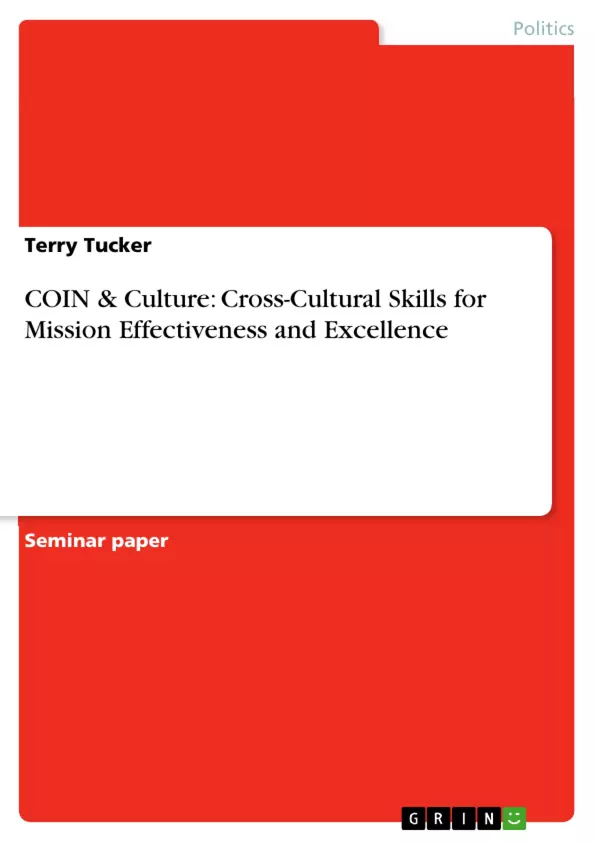This paper is based on the US experience.
The US Army is active and present in many nations in the world today in a variety of capacities ranging from missions to operations. In every nation the US Army visits, they encounter that nations’ Culture and Worldview. Sometimes that encounter is positive and leads to easily built working relationships for a common goal, yet other times that encounter is very difficult leaving our soldiers and civilians experiencing extreme levels of culture shock (what occurs when two or more people groups that have vastly different worldviews encounter one another) which in turn makes the mission nearly impossible to accomplish. This paper is a joint attempt to combine cross-cultural skills gleaned from global Christian Missionary experience, Soldier deployed experience and Counter Insurgency (COIN) philosophy.
Inhaltsverzeichnis (Table of Contents)
- Introduction
- Culture and Worldview
- Culture Shock & Responses
- Personal Entry Posture
- Why does it matter, aren't we just doing a job?
Zielsetzung und Themenschwerpunkte (Objectives and Key Themes)
This paper aims to combine cross-cultural skills from Christian missionary experience, military deployment experience, and Counter Insurgency (COIN) philosophy to enhance mission effectiveness and excellence for the US Army. The goal is to equip soldiers with the necessary cultural awareness and coping skills to navigate diverse cultures, build relationships, and achieve mission objectives.
- The impact of cultural differences and worldview on military operations.
- The significance of understanding cultural norms and expectations in achieving mission success.
- The challenges of culture shock and its impact on individuals and teams.
- The importance of personal entry posture and coping skills in cross-cultural interactions.
- The application of cross-cultural training to enhance COIN operations.
Zusammenfassung der Kapitel (Chapter Summaries)
- Introduction: This chapter introduces the importance of cross-cultural skills for the US Army in today's globalized world, highlighting the challenges posed by cultural differences and the need for enhanced training and awareness.
- Culture and Worldview: This chapter explores the concept of culture and worldview, explaining how they shape individuals' perceptions and interactions. It emphasizes the importance of recognizing and understanding these differences to navigate cross-cultural encounters effectively.
- Culture Shock & Responses: This chapter delves into the concept of culture shock, examining the dissonance experienced when individuals from different cultures encounter each other. It highlights the various responses to culture shock, including frustration, misunderstanding, and tension. It also introduces the Entry Posture Diagram (EPD) as a framework for understanding and managing personal responses to cross-cultural situations.
Schlüsselwörter (Keywords)
This paper focuses on cross-cultural skills, cultural awareness, worldview, culture shock, COIN operations, mission effectiveness, military deployment, and personal entry posture. It explores the intersection of these concepts and their relevance to enhancing US Army operations in diverse cultural contexts.
Frequently Asked Questions
Why are cross-cultural skills important for the US Army?
They are essential for building positive relationships in foreign missions, reducing culture shock, and ensuring mission effectiveness in diverse environments.
What is the "Entry Posture Diagram" (EPD)?
The EPD is a framework used to help soldiers understand and manage their personal psychological responses when encountering new and different cultures.
How does culture shock affect military missions?
Extreme culture shock can lead to frustration and tension, making it nearly impossible to build the necessary trust with local populations to achieve mission goals.
What can the military learn from Christian missionaries?
Missionaries have long-standing experience in adapting to foreign worldviews and building community ties, which can be applied to Counter Insurgency (COIN) strategies.
What is the difference between culture and worldview?
Culture refers to the behaviors and norms of a group, while worldview is the underlying set of beliefs and perceptions that shape how individuals interpret reality.
- Quote paper
- Professor of History Terry Tucker (Author), 2011, COIN & Culture: Cross-Cultural Skills for Mission Effectiveness and Excellence, Munich, GRIN Verlag, https://www.grin.com/document/165136



